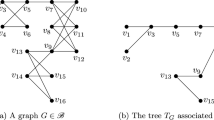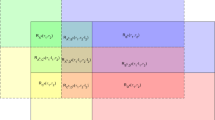Abstract
A complex orthogonal design (COD) used in space-time block codes is a kind of combinatorial design. It has been well studied because it has a fast maximum-likelihood decoding algorithm and achieves full diversity. When designing CODs, there are seven characteristics that should be considered, which include code rate, decoding delay, transceiver signal linearization, peak-to-average power ratio, etc. In this paper, we study the relationships among these design criteria. We prove that the maximum rate of generalized CODs (GCODs) that meet the last five criteria is 1/2. Moreover, we present a new method to construct GCODs based on CODs. Using this method on balanced complex orthogonal designs (BCODs), we obtain a novel class of GCODs that performs almost perfectly with respect to all the seven properties.
Similar content being viewed by others
References
Alamouti S M. A simple transmit diversity technique for wireless communications. IEEE J Sel Areas Commun, 1998, 16: 1451–1458
Tarokh V, Jafarkhani H, Calderbank A R. Space-time block codes from orthogonal designs. IEEE Trans Inf Theory, 1999, 45: 1456–1467
Adams S S, Davis J, Karst N, et al. Novel classes of minimal delay and low PAPR rate 1/2 complex orthogonal designs. IEEE Trans Inf Theory, 2011, 57: 2254–2262
Su W F, Batalama S N, Pados D A. On orthogonal space-time block codes and transceiver signal linearization. IEEE Commun Lett, 2006, 10: 91–93
Yuen C, Guan Y L, Tjhung T T. Power-balanced orthogonal space-time block code. IEEE Trans Veh Techno, 2008, 57: 3304–3309
Yuen C, Guan Y L, Tjhung T T. Orthogonal space-time block code from amicable complex orthogonal design. In: Proceedings of IEEE International Conference on Acoustics, Speech, and Signal Processing (ICASSP’04), Montreal, 2004. 469–472
Das S, Rajan B S. Square complex orthogonal designs with low PAPR and signaling complexity. IEEE Trans Wirel Commun, 2009, 8: 204–213
Liang X B. Orthogonal designs with maximal rates. IEEE Trans Inf Theory, 2003, 49: 2468–2503
Lu K J, Fu S L, Xia X G. Closed-form designs of complex orthogonal space-time block codes of rates (k +1)/(2k) for 2k - 1 or 2k transmit antennas. IEEE Trans Inf Theory, 2005, 51: 4340–4347
Adams S S, Karst N, Pollack J. The minimum decoding delay of maximum rate complex orthogonal space-time block codes. IEEE Trans Inf Theory, 2007, 53: 2677–2684
Adams S S, Karst N, Murugan M K. The final case of the decoding delay problem for maximum rate complex orthogonal designs. IEEE Trans Inf Theory, 2010, 56: 103–112
Li Y, Kan H B. Complex orthogonal designs with forbidden 2 × 2 submatrices. IEEE Trans Inf Theory, 2012, 58: 4825–4836
Das S, Rajan B S. Low-delay, high-rate nonsquare complex orthogonal designs. IEEE Trans Inf Theory, 2012, 58: 2633–2647
Liu X D, Li Y, Kan H B. On the minimum decoding delay of balanced complex orthogonal designs. IEEE Trans Inf Theory, 2015, 61: 696–699
Wang H Q, Xia X G. Upper bounds of rates of complex orthogonal space-time block codes. IEEE Trans Inf Theory, 2003, 49: 2788–2796
Su W F, Xia X G, Liu K J R. A systematic design of high-rate complex orthogonal space-time block codes. IEEE Commun Lett, 2004, 8: 380–382
Adams S S, Karst N, Murugan M K, et al. On transceiver signal linearization and the decoding delay of maximum rate complex orthogonal space-time block codes. IEEE Trans Inf Theory, 2011, 57: 3618–3621
Su W F, Xia X G. On space-time block codes from complex orthogonal designs. Wirel Personal Commun, 2003, 25: 1–26
Li Y, Kan H B, Yuan C, et al. The maximal rates and minimal decoding delay of more general complex orthogonal designs. Sci China Inf Sci, 2010, 53: 1826–1832
Author information
Authors and Affiliations
Corresponding author
Rights and permissions
About this article
Cite this article
Kan, H., Liu, X. & Han, G. On the criteria for designing complex orthogonal space-time block codes. Sci. China Inf. Sci. 59, 082303 (2016). https://doi.org/10.1007/s11432-015-5473-9
Received:
Accepted:
Published:
DOI: https://doi.org/10.1007/s11432-015-5473-9




